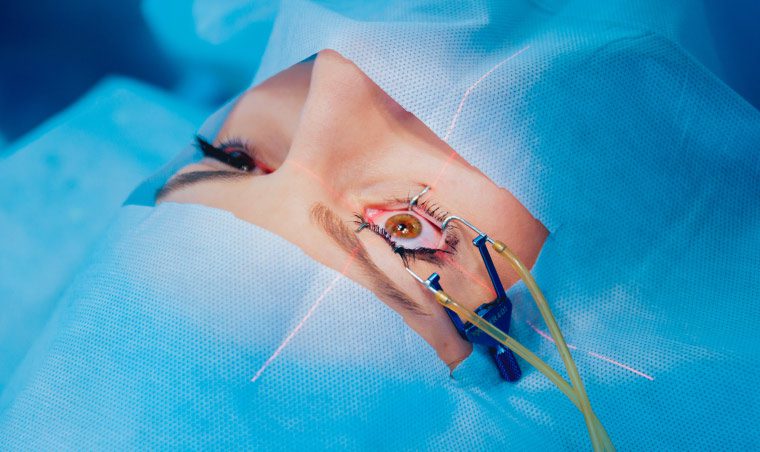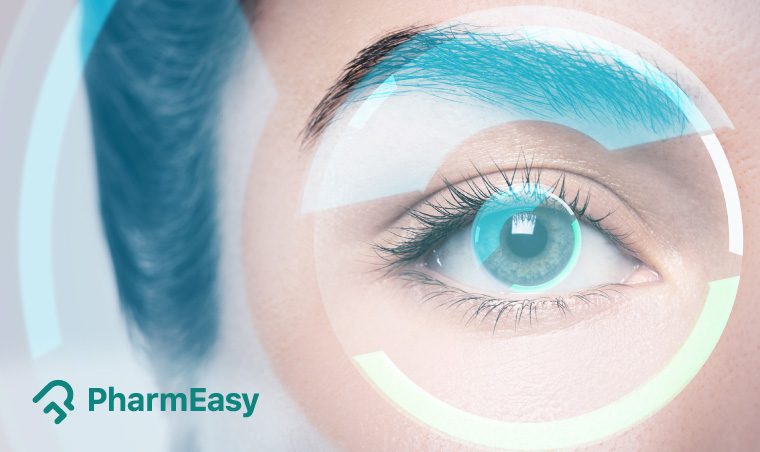What Food To Eat And What To Avoid After LASIK?
By Dr. Raghu Nagaraju +2 more

Get,

to manage your symptom
Get your,


4 Cr+ families
benefitted

OTP sent to 9988776655



You’ve successfully subscribed to receive
doctor-approved tips on
Whatsapp

Get ready to feel your best.

Hi There,
Download the PharmEasy App now!!


Register to Avail the Offer
Send OTPBy continuing, you agree with our Privacy Policy and Terms and Conditions

Hi There,
Sign up on PharmEasy now!!
Trusted by 4 crore+ families

OTP sent to 9988776655



You have unlocked 25% off on medicines




Code: NU25
By Dr. Raghu Nagaraju +2 more
Table of Contents

LASIK stands for laser in-situ keratomileusis, a popular surgery that aims to correct nearsightedness, farsightedness or astigmatism. LASIK is one of many surgeries that correct vision by reshaping the cornea, the transparent front part of your eye, so light falls on the retina correctly. People opt for LASIK to get rid of spectacles.
You may not be able to eat before or after some type of surgery. This is not the case with LASIK. A light meal and plenty of water are encouraged before the procedure. After LASIK, it’s fine to eat, as long as you consume healing foods.

It is important to eat healthy foods in order to maintain a healthy body. Consuming the right foods can help support the health of your eyes.
So, the question is:
What food to eat and what to avoid after LASIK surgery? There are no specific food restrictions related to LASIK unless advised otherwise by your doctor. Eating healthy is always encouraged for good healing and here we have a list-
In order to bring your vision to its best state, eating whole grains can be extremely beneficial. These foods contain low glycaemic indexes and are recommended by your surgeon after the surgery as opposed to refined carbs and sugary beverages.
Besides vitamin E, zinc and niacin, whole grains contain essential nutrients that are good for your eyes. A few examples include:
If you love eggs, you may add them to your diet. Eggs are a good source of proteins and healthy fats.
A diet rich in vitamin C helps in recovery and healing. Vitamin C is mainly found in citrus fruits. It is best to go natural rather than take multivitamins.
Some citrus fruits that you can include in your diet:
These leafy greens contain antioxidants and some pigments that may delay the ageing of the eye. Vegetables like these can lower your risk of some eye diseases such as cataracts and AMD. Leafy green veggies like broccoli, peas and avocados can also help the eye heal quickly after LASIK surgery.
We are all aware of the impact carrots have on the health of our eyes. Carrots are especially helpful after undergoing LASIK. Carrots are an excellent source of vitamins A, C and carotenoids, all of which work to protect your eyes.
Among the foods that accelerate healing, nuts should not be missed. Nuts are rich in vitamin E and omega-3 fatty acids. Eating a handful of nuts every day can be very beneficial for the health of your eyes.
Red meat and sausage, as well as processed meats high in saturated fat, often contribute to high cholesterol levels. It causes plaque to accumulate in the eye’s macular vessels, which reduces blood flow. Eating fatty meats can raise your risk of developing macular degeneration, a condition that affects the retina and causes vision loss.
When eaten in large or moderate amounts, snacks such as chips, cookies and candy can negatively affect your vision. According to studies, the fats in these junk foods are unhealthy for your eyes and can result in eye diseases. As well as the unhealthy fats contained in these foods, the presence of salt and sugar hinders the blood flow to the eyes and affects the health of the body’s organs and circulatory system.
In addition to being unhealthy for the eyes, a sugar-laden diet is also unhealthy for the body. The constant consumption of large amounts of sugar raises your blood sugar level, which in turn causes eye-related complications.
When oils are heated and reheated to prepare food, the molecular structure changes, which is bad for our whole body and our eyes are no exception. Fried foods also affect the heart and impair blood circulation, both of which affect the blood supply to the eyes, resulting in blurry vision.
You must provide your eyes with lots of protein and other vital nutrients for healing after LASIK eye surgery. Eggs are a fantastic source of nutritional protein, and they also include healthy nutrients. To my knowledge, lutein and zeaxanthin, antioxidants that may save your eyes from harm, are abundant in eggs. Additionally, these may assist in lowering the risk of cataracts or macular degeneration in older people.
Dr. Siddharth Gupta, B.A.M.S, M.D (Ayu)
It is important for patients to remember certain dos and don’ts after LASIK surgery in the first few days and weeks after the procedure. Here are some of them:
Nuts, especially Brazil nuts and walnuts, are another fantastic source of nutrients for your eyes. They include zinc, vitamin E, and omega-3 fatty acids, which may help aid age-related eye problems and dry eye syndrome.
Dr. Rajeev Singh, BAMS
After LASIK, it is important to eat foods that promote wound healing and tissue regeneration. Chicken, fish, eggs, beans and nuts are some great options. The omega-3 fatty acid found in many fish may also help reduce dry eyes.
Lactose-containing products such as milk and yoghurt are beneficial to the eyes. Both yoghurt and milk contain zinc and vitamin A. These vitamins protect the cornea, while zinc helps carry them to the eyes from the liver.
Vitamin A and antioxidants are highly concentrated in papayas, which promote eye health. The antioxidants protect the corneas, while vitamin A stops the degeneration of the retina. It provides an all-around benefit.
You should expect your eyes to be very sensitive in the first 24 hours following LASIK surgery because they are still healing. Therefore, you should wait at least 24 hours before using your phone, computer, tablet or watching television.
Grains have a low glycemic index, so they’re better for your eyes than other forms of carbs (white rice, pasta, processed bread). Protect your eyes by eating foods such as quinoa, brown rice, whole wheat and oats. These grains are also rich in vitamin E and zinc. You can have rice in moderation, provided your doctor has not advised you otherwise due to any other medical condition.
Disclaimer: The information provided here is for educational/awareness purposes only and is not intended to be a substitute for medical treatment by a healthcare professional and should not be relied upon to diagnose or treat any medical condition. The reader should consult a registered medical practitioner to determine the appropriateness of the information and before consuming any medication. PharmEasy does not provide any guarantee or warranty (express or implied) regarding the accuracy, adequacy, completeness, legality, reliability or usefulness of the information; and disclaims any liability arising thereof.
Links and product recommendations in the information provided here are advertisements of third-party products available on the website. PharmEasy does not make any representation on the accuracy or suitability of such products/services. Advertisements do not influence the editorial decisions or content. The information in this blog is subject to change without notice. The authors and administrators reserve the right to modify, add, or remove content without notification. It is your responsibility to review this disclaimer regularly for any changes.

Leave your comment...
Comments